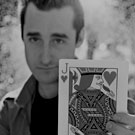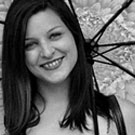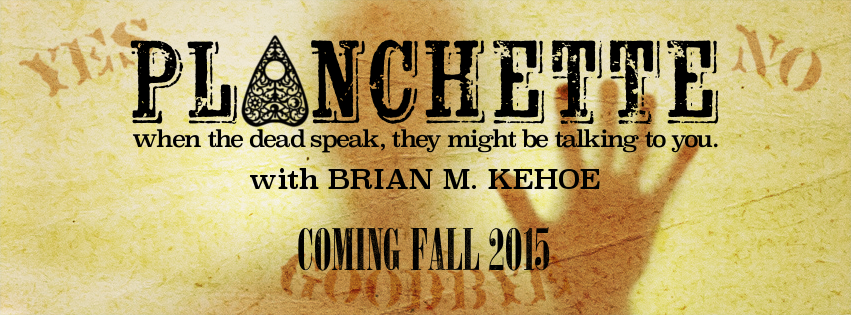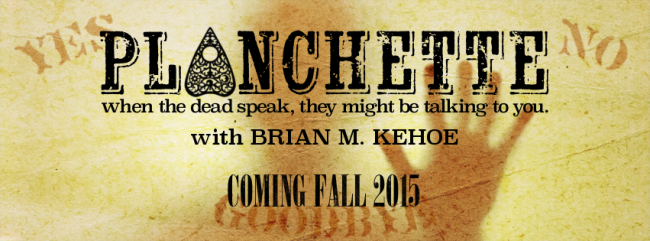It’s only a game— isn’t it? The only toy of one’s childhood that was often not allowed inside the house; The Ouija Board. It’s mysterious ability to commune with the dead has kept children up all night at sleepovers and Halloween parties. Few people know that like The Star-Spangled Banner, the Ouija Board finds its roots in Baltimore. Local magician Brian M. Kehoe in collaboration with area playwright Annelise Montone are working together for a new experiential theatre production that brings audience participation to the next level. Their subject of choice? The Ouija Board. Follow them through this exclusive TheatreBloom interview to learn all about their new project Planchette— are you brave enough to open the door?
If you could give us a brief introduction, tell us who you are, how you’re involved with this project and what in the area the readers might recognize of your work, we’ll get started.

Brian M. Kehoe: My name is Brian M. Kehoe and I am a magician as well as stage actor and theatre artist. I live in Remington, and I act at several local theater companies including Vagabond Players (upcoming: “Greater Tuna,” past: “Mousetrap”), and late Mobtown Players (“House of Yes”). I’m also found giving lectures on magic and its application in history (The Flag House) and sound designing for DNA Theatre. I knew I wanted to do a brand new show in Baltimore that combined magic and theatre that wasn’t “just another magic show.”. Planchettet’s is an interactive theatre experience where I guide the audience through a series of Victorian era rituals to try to contact the other side. Everybody in the audience will have an opportunity to participate in the experience.
When I first moved to Baltimore in 2011 I knew I wanted to get back into theatre and performing magic, something that I had given up years ago, so after a year of getting acclimated I started auditioning for every theatre in the city. From April 2012 – December 2013 I was in about 12 different plays at area theatres. Then I shifted gears and started focusing on performing magic, working at two major outdoor festivals last year along with teaching magic to kids and adults.

Annelise Montone: I’m Annelise Montone and I go by Annie a lot to differentiate from my professional work. I’m collaborating with Brian on the show, and I’m writing and doing a lot of that stuff. I’m a playwright here in Baltimore and over the last couple of years I’ve written two full-length plays and a short one-act for Charm City Fringe. My last play was The Sorrow Message written for and produced by Daydreams + Nightmares Aerial Theatre back in April. I’ve always been really interested in everything that’s creepy and Halloween-y and weird. I was a ghost tour guide here in Baltimore for seven years. My sister and I are going to be creating the world’s first traveling Halloween Museum and that’s a current work in progress.
I’ve been into all of that sort of stuff all my life. So when Brian approached me with the idea of doing some type of séance, I said “Yeah! We’re going to write that and do it!” It just took off from there. We’ve had a lot of success so far, people really seem to be into it.
Can you talk a little bit about where the ideas or inspirations for this show came from? Where did it gain its roots? Where did is springboard from? Where is it going?
Brian: A couple of years ago I did a talk called “From Sorcery to Séance” over at the Star-Spangled Banner Flag House and that’s kind of what re-sparked this interest in séances and magic in me again. I did illusion design for Ghost: The Musical. After that we did a show called Spectacle Obscura where we worked with DNA Theatre. It was pretty awesome. We explored more of these dark themes and Annelise wrote that for me as well. We did a brief little “spirit cabinet” piece in that as well. An audience member got in the box, they got tied up, stuff flew around, and it was really cool. That’s sort of where all of this began and we’d like to explore these things a little further.
Annelise: When we did the new version of Spectacle Obscura, and I wrote for Brian for the first time it was a magical mind meld. And it was great. I think that it was probably my influence, Kel’s (Kel Millionie, Artistic Director of DNA Theatre) influence aesthetically, that really helped to find and form this thing that really works for Brian.
Brian: There is a lot of influence from all those works I mentioned, but I’ve always been fascinated with séances and dark magic.
Is this a show that’s going to be produced by another company, like DNA Theatre?
Brian: Right now the show is professional independent project and collaboration. We’re not associating the experience with any local theatre company directly. . We’re actually— and I can’t really announce it yet— e partnering with a historic mansion in downtown Baltimore.
Annelise: We are finalizing the contract with them now, so we won’t announce it just yet, but it’s a real mansion. And it’s going to be awesome. And we’re very excited about it.
What exactly is a Planchette? Other than the title of your show?
Brian: It is the little heart-shaped device…pointer…for the Ouija Board. Annie knows more on its backstory:
Annelise: It’s French. It comes from the history of the board itself. Before the board as we know it there was a table with a hole and a pencil hanging down, and that part was called the Planchette. I don’t know of anything else that’s called that. It is something specific to the Ouija Board. So the secondary tagline there is: “When the dead speak, they might be talking to you.” So that’s the idea we’re doing with this experiential show. They’re going to be talking directly to you.
When you say experiential theatre, what does that mean?
Brian: Do you want to tackle that?
Annelise: Well, traditional magic shows are semi-participatory. You know, “I need a volunteer.” That’s what people love about magic shows. But with Planchette one we wanted to make sure that everyone was working together to create the illusions that make the piece work. Without the audience this show doesn’t work. Brian, is of course, a magician and has created some really stellar effects that are specific to Planchette . But without the audience and the psychology of the audience it doesn’t work. So without giving away— because we want people to come to the show and we want them to be surprised— everybody is working together to create the experience.
You’ve thrown around the word séance a fair bit now. Are you basing this persona and concept of the show on anything that is specifically local to Baltimore other than the fact that the Ouija Board guy is buried in Baltimore?
Brian: We are. We are touching a lot on the history of The Ouija Board. The Ouija Board started here in the late 1800’s. And when you say “The Ouija Board guy” I think you’re talking about Elijah Bond and his gravestone. But we’re talking about the bigger picture Ouija Board guys. The Fuld Family— and specifically William and Isaac, brothers— they really took over that patent from Elijah Bond and created what pop-culture knows to become the empire of Ouija Boards.
Annelise: The Ouija Board as we know it today attains its power because it’s very familiar and iconic. It’s familiar and unfamiliar at the same time. That board as we know it was created by the Fuld Brothers after the patent. And even when Elijah Bond had the patent, the Fuld Brothers were very involved with the creation of the board. It became a household name.
There is a frightening element to The Ouija Board, particularly with the way it has been suffused into popular culture. Are there veins of the horror or thriller genre worked into this show or does this lean more toward the spectacle and supernatural side of things?
Brian: How much do we want to give away?
Annelise: Hmm. I think I would call this spectacle. I don’t know that I would call this horror. I mean, there are certainly some frightening elements. But we play with the whole idea that the board has its associations with fear. That it has its mysteries.
I know personally, I received a board as a birthday present my sophomore year in high school and was not allowed to bring it into the house because my mother was afraid of it.
Brian: See, everybody has those stories! And we’re going to be using those personal histories in the show. At one point in the show several audience members will write down their stories about Ouija and I’m going to have another participant choose one of those stories and I’m going to ask the spirits to help me reveal the selected story.
Do you guys have your own personal “Ouija Board stories?”
Annelise: Sure. I grew up in a family that loved Halloween. I come from them, I’m their child and so is my sister. My mother loved the Ouija Board and we had one in the house. I love it. It was a staple of every slumber party I ever had. I loved it so much. I’m aware of other people who didn’t think that way about it and who didn’t like it. I can’t think of another object that has that connotation. That you can buy in a store—
Brian: That you can buy at Toys R Us—
Annelise: Or Target. You can go to a store and purchase this object but people won’t let it into the house. I don’t know of anything else like that. That’s powerful. The board has power.
Brian: I think I was 12, strangely enough, I found a Ouji board in my aunt’s basement and I was like “I’m going to take this home, this will be fun.” My mom would not let it in the house! So I never got to play with one as a child. And along that vein— and Annie doesn’t know this yet because I haven’t had a chance to tell her before we came here— I’m having a hard time finding a Director for this. The person we initially had lined up for this came back and said, “I don’t think I can do this.” Because the idea freaked them out!
There are people who are freaked out by the Ouija board. I mean, Planchette will be a theatrical experience, there’s going to be a little Hollywood in there because that’s what people expect. But it’s not real. Or is it?
Annelise: Let me tell you something and this is something that I know to be true. For everybody who is scared of the board or the dead— because that’s what the board is used for to contact the dead, well we hope— but the living are creepier than the dead ever could be. Ruminate on that. Just look outside your window here in Baltimore and you will all agree. There’s certainly nothing scarier than that in our show.
What has been the biggest challenge with this show?
Annelise: Apparently finding a Director.
Brian: Who will be brave enough?
Annelise: Let me say this. Brian and I get along like a house on fire. We love working with each other. Sorry, that’s a southern expression. A house on fire gets along very well right until it burns to the ground. But we form a great partnership. It’s not hard to work with him at all. I’m not just saying that because he’s sitting here. He’s really great. We’ve worked together on other projects in the past. But I think for me the most challenging part is that what I’m writing, Brian is on board with and can actually do. And that we’re on the same page. I can say anything I want, but if he says “we can’t really pull that off necessarily.” Or the better moments— where he says “hey we can pull that off and here are the options for it.” It’s just writing within a constraint like that is very hard. But that’s what really drew me to Spectacle because I really enjoy that challenge. Writing for a magician is so cool. For a writer? It’s the best thing I’ve ever done, it’s just so awesome to do. I dig it and I’m thrilled I’ve got a chance to do it again.
Brian: With any theatrical endeavor, money is always the hard part. Our biggest expenses are props and costumes. We need to set a mood. The mansion that we’re working with will help to set that, but we need it to go further than that.
Annelise: And I’ll say this too. Challenges from a writing perspective— you know the Fuld Brothers lived here in Baltimore, and we’re using their story and their ancestors still live here. So we want to be really careful how we present the story. They were real people. We want to tell the tale with the reverence they deserve. The other challenge is that it’s copyrighted so we have to watch that. We are being very careful. We are working with Robert Murch, who is the world’s expert on the Ouija Board. We are working with him specifically to be very careful with this history and the copyrights. He is in close contact with the Fuld Family. He’s been very enthusiastic about our project so far and we’ve brought him in as a consultant.
Brian: He’s been great.
Annelise: He’s been very proactive.
Brian: I think for me, as far as being a magician, the challenge is the show itself. It’s going to be different every night depending on who is in the audience. And that’s both terrifying and exciting. Typically as a magician you bring up one or two people from the audience and the rest of your show stays the same. But this is going to rely largely on the audience to guide it.
Annelise: That’s how participatory this show is. It will be so different from night to night just depending on the audience. The mix of people you get is going to determine the show.
Brian: And the audience is not going to be huge. Maybe 25-30 people. We want this to be intimate.
What has involving yourself in this project taught you about yourself as a performer and a playwright?
Annelise: As a writer? It’s taught me to understand that not everything belongs to you. Other people have claim to the story and you have to be very careful with how you present something when you’re working with historical figures and historical reality. You have to be really mindful. That’s something that has really translated to other works, being careful how I use and present things. Baltimore is my home town and I love her so much. One of the reasons we’re doing this right now is to show people all the beauty that is still here in the arts. Baltimore got hit real bad, got real slammed and there is a lot of negativity about the city. It’s so weird because it’s not even in the city— it’s just being said about the city. That’s not our Baltimore. We are responsible for what happens here but that’s good and bad. We want to be responsible for good and exciting thing. Baltimore is an arts town. The mayor even said it, arts and sports. And we really want to contribute to that right now. Now, whether it’s the time to do a spooky creepy fucked-up to all hell— wait can I say that? The point is we want to bring more art and more artists to our city. We’re all together here in this city and there are lots of opportunities.
Brian: You know, there are people who have lived in Baltimore all their lives and when I started talking to them about this project— they had no idea that Ouija originated here. I get all the surprise faces. I think reminding people that something as creepy as Ouija came from Baltimore and claiming it is a very good thing.
Annelise: We do need to claim it. We claim a lot of brilliant things like Edgar Allen Poe and Ouija should be a part of that fierce pride that we have here in Baltimore.
Anything else you’d like to say about why people should come and see Planchette or what you’re hoping they’ll take away from the experience?
Annelise: You’re not going to have another night at the theatre like this.
Brian: Not at all.
Annelise: That’s what we want people to walk away thinking. That they’ve never really had an experience like that before. We think it’s going to work. At this point I am 100% sure that it’s going to work.
Brian: That’s why we have a workshopa sometime late this Summer. For now we’re keeping the workshop performance invite-only.
Annelise: It’s such a participatory event that we literally cannot perform it until we understand how the audience dynamic is going to flow.
Brian: I can rehearse it in my living room all I want but unless I have audience members to work with… so I’m looking forward to that workshop.
Annelise: The way that you get invited to this workshop— this preview if you will— is that you donate to our campaign via the IndieGoGo page that we’ve set up. That is a really cool thing to do. It’s a $75 dollar donation for the invitation so it’s cheap, but you’re not going to find another experience like that, especially in the dead of Summer.
Brian: Everyone who comes to this workshop will be considered a producer. We are looking for feedback from our test audiences before we take it to the next level.
Annelise: So if you are a theatre person, if you are into this stuff, or if you have a lot of ideas about a lot of these things it’s a great way to contribute and help us with the process of developing it.
For more information on Planchette take a look at the IndieGoGo campaign page here.
For more information on magician Brian M. Kehoe visit his website.


